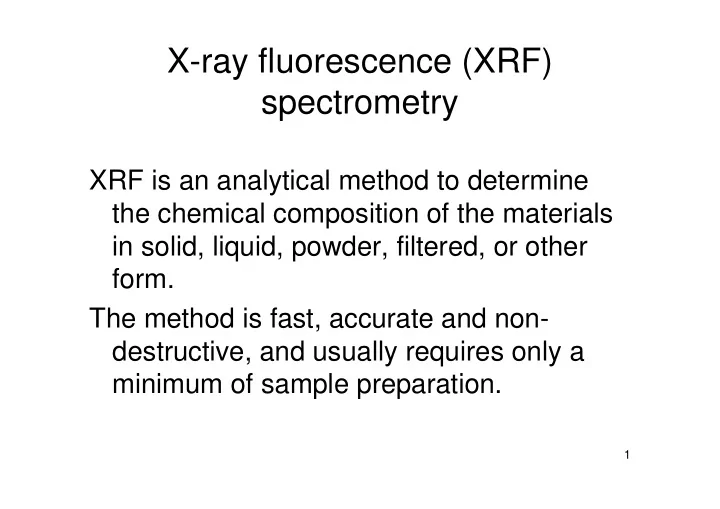

X-ray fluorescence (XRF) spectrometry XRF is an analytical method to determine the chemical composition of the materials in solid, liquid, powder, filtered, or other form. The method is fast, accurate and non- destructive, and usually requires only a minimum of sample preparation. 1
Spectrometer systems • Energy dispersive system (EDXRF) (C-U) • Wavelength dispersive system (WDXRF) (Be-U) The concentration range: ppm-100%. 2
Basics of XRF X-rays 3
Interaction of X-rays with matter 4
Production of characteristic fluorescent radiation 5
6
The Siegbahn and IUPAC notation (e.g. Fe K α , Cr KL3 ) Siegbahn IUPAC Siegbahn IUPAC K α 1 K-L3 L α 1 L3-M5 K α 2 K-L2 L α 2 L3-M4 K β 1 K-M3 L β 1 L2-M4 K β 3 K-M2 L β 2 L3-N5 7
Moseley law 1 [ ] 2 = ⋅ − σ K Z λ λ , wavelength; K, constant; Z, atomic number; σ , constant. 8
The fluorescence yield is the ratio of the emitted fluorescent photons and the number of incoming photons. 9
Absorption and enhancement effects 10
Absorption and analysis depth 11
Rayleigh and Compton scatter 12
13
Polarization 14
The XRF spectrometer 15
The EDXRF spectrometer 16
17
18
The WDXRF spectrometer 19
The WDXRF spectrometer 20
FeK α FeK β NiK α MnK α MnK β 21
Comparison of EDXRF és WDXRF spectrometers EDXRF WDXRF Elemental range C, Na…U Be…U Detection limit Less optimal for light Good for Be an all heavier elements. elements. Sensitivity Reasonable for light elements. Good for heavy elements. Good for heavy elements. Resolution Good for light elements. Less optimal for heavy elements. Costs Relatively inexpensive. Relatively expensive. Power consumption 5-1000 W 200-4000 W Measurement Simultaneous Sequential 22 Critical moving parts No Crystal, Goniometer
X-ray tubes 23
Secondary targets Fluorescent targets (heavy elements). Barkla targets (e.g. Al 2 O 3 ). Bragg targets (crystal). The target acts as a source, and the radiation coming from the target is used to irradiate the sample. 24
Detectors 25
Multi channel analyzer (MCA) 26
Escape peaks and pile-up peaks 27
Filters Filters are placed between the source and the sample. Filter used to filter tube lines: 28
Filter used to filter background: 29
Analysing crystal and collimator A collimator is a set of parallel plates. It is used to obtain parallel X-ray beams. 30
• Masks ( A mask is placed between the sample and the detection system.) • Spinner (A spinner rotate the sample to even out the effects of non-homogeneity and scratches.) • Vacuum and Helium system (Vacuum chamber. Air can significantly absorb the low-energy radiation.) 31
XRF analysis • Sample preparation • XRF measurement • Qualitative analysis • Quantitative analysis 32
Sample preparation • Representative and homogeneous sample • Sample holder, cup (10-100 mm Ø) • Sample types: – Solids; – Powders (loose or pressed powder); – Beads (1000-1200° C, e.g. Li 2 B 4 O 7 flux); – Liquids; – Materials on filters. 33
XRF measurements • Optimum measurement conditions: kV mA time filter air, helium spinner etc. 34
Qualitative analysis in EDXRF • Background fitting • Peak search • Deconvolution • Peak match 35
Qualitative analysis in WDXRF • Background subtraction • Peak search • Measuring peak height • Line overlap correction • Peak match 36
Counting statistics and detection limits Elements are said to be detectable if: 37
Quantitative • Matrix effects analysis in • Matrix correction models EDXRF and • Calibration • Standardless analysis WDXRF 38
Fundamental parameter (FP) matrix correction models 39
EDXRF spectrum (Sárisáp kaolin) 40
Recommend
More recommend